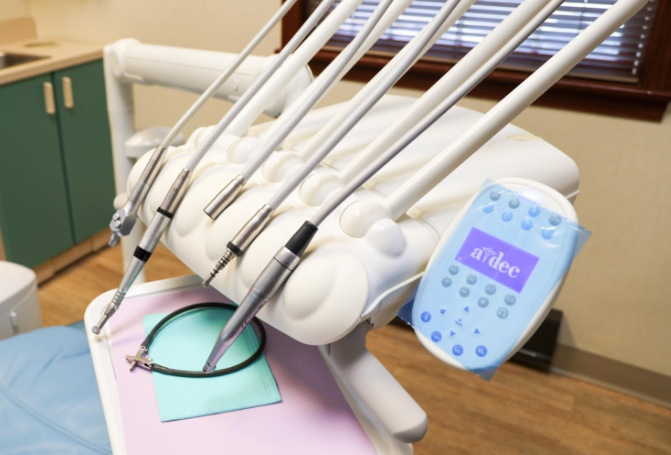Dental Care and Your Child’s Special Needs
Dr. Erin Madar
Children with chronic illnesses or disabilities that limit movement often face challenges in maintaining their oral health needs. When coupled with anxiety and fear about seeking treatment, which is common among adults and children of all ages and abilities, this is a recipe for a dental disaster. I regularly use my experience in special needs dentistry to help create personalized instructions and recommendations for my patients and their caregivers. With just a few simple interventions and adaptations, children with motor function challenges can improve their tooth care technique, gain independence, and feel empowered to take charge of their own dental care needs.
preparing for a dental visit
For patients with special healthcare needs, anxiety can often be worsened by overstimulating sensory elements such as loud noises, bright lights, vibrations, and tools being used in the mouth. As a parent, there are many ways to help prepare your child for a visit to a dental office, in order to make the experience as comfortable as possible.
Begin by choosing a dentist who can support your child’s individual needs. The Special Care Dental Association (SCDA) is dedicated to improving oral health and enhancing the quality of life for individuals with special needs. Their free online dental referral system helps parents and caregivers find a dental office near them that is prepared to manage special healthcare needs.
A desensitization appointment is often a great way for patients to ease into a new dental home and get used to the environment. This visit allows familiarity and comfort when the patient returns for treatment. Bringing your child’s favorite music, fidget toys, and other comfort items known to help them feel safe.
Discuss sedation options with the dentist including nitrous oxide (laughing gas) or general anesthesia. These temporary comfort measures may be worth it to help your child remain calm.
At Home Oral healthcare
It is important to develop a regular oral health routine at home including flossing and brushing twice a day for at least two minutes. To help meet this goal try some of the following strategies.
Invest in an electric toothbrush with a built in timer.
Use alarms, sticky notes on the bathroom mirror, and sticker charts to encourage regular brushing.
Play a favorite song for two minutes to encourage your child to keep brushing. Here are some fun toothbrushing songs for your consideration.
Purchase a modified toothbrush or make modifications if fine motor skills are challenge.
Wide-handle or double-sided toothbrushes are one specific tool aimed to help improve home care. These brushes are much easier to grip for patients that may struggle with dexterity.
modify your own toothbrush by putting a tennis ball on the end or creating a wider grip by wrapping it in duct tape.
An electric water-flosser with a wide handle is also a great tool for patients that struggle with fine motor skills. The design of these devices are often easier to hold compared to traditional floss.
Time magazine recently named the Curaprox Samba Toothbrush one of the “Best inventions” of 2023. This device was created to help patients with disabilities and limited dexterity to brush their entire mouth with one easy-to-use device.
Manage symptoms of dry mouth to improve oral health. Dry mouth can be very uncomfortable and increase the risk of cavities forming.
Encourage proper hydration.
Chewing on a sugar free gum or sucking on xylitol lozenges between meals can also help increase salivary flow rate and improve comfort for those suffering from a dry mouth.
Talk to your child’s medical care team about preventing dry mouth that is caused by medication side effects, mouth breathing, and sleep apnea.
Use fluoride to help prevent cavities.
As cavities start to form, teeth become softer and lose their strength. Fluoride is a naturally occurring mineral that can help repair the weakened tooth structure. For patients that are at high risk for cavity formation, your dentist may recommend ways to increase fluoride including over-the-counter and prescription-strength fluoride toothpastes and rinses. For patients that struggle with fine motor skills, custom trays can be made that adapt to their teeth and hold a fluoride treatment.
More from RedTreehouse.org:
Written By: Dr. Erin Madar
Dr. Madar is active in numerous professional organizations focusing on caring for people with special needs including the Special Care Dental Association (SCDA) and the International Association for Disabilities and Oral Health (IADH). Dr. Madar is in private practice in Northfield, Ohio. She is a graduate of Denison University and received her dental degree from Case Western Reserve University School of Dental Medicine.


